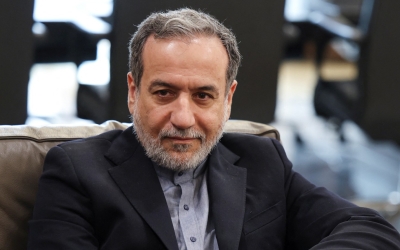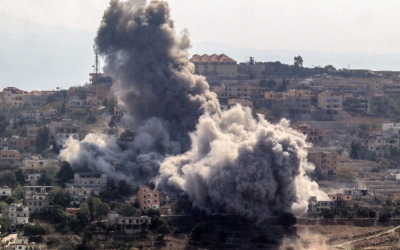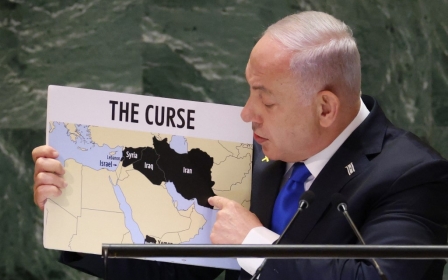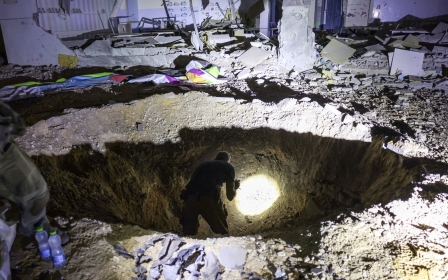Iran sent tankers back to key oil facility in sign it believes an Israeli attack was averted
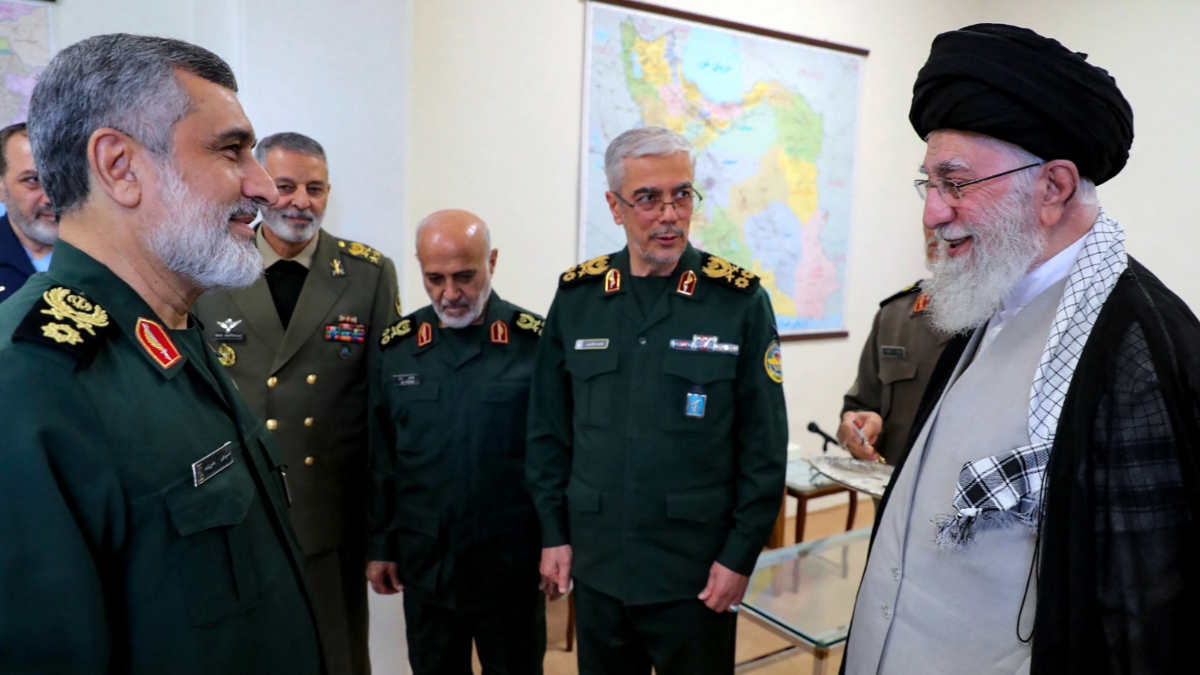
Iran has sent its oil tankers back to a key Persian Gulf oil export hub after evacuating them last week, in a sign that Tehran may believe it skirted an Israeli strike on one of its most important energy facilities.
Two VLCC supertankers belonging to the National Iranian Tanker Company (NITC) are now loading oil at Kharg island, home to a massive terminal from which 90 percent of the Islamic Republic’s oil is exported, according to data shared with Middle East Eye by TankerTrackers.com. An Aframax tanker not owned by NITC is also loading there.
That means Iran is exporting 4.7 to 4.9 million barrels of oil on bulky, easily targeted tankers, even as it girds for what Israel says will be a "significant retaliation" to last week’s massive ballistic missile attack.
US President Joe Biden jolted oil markets last week when he said the US and Israel were discussing strikes on oil facilities. He later walked back the comments, saying, “If I were in their shoes, I would be thinking about other alternatives than striking Iranian oil fields.”
The NITC’s decision to send vessels back to Kharg Island means Iran now appears to be in a “risk-off mode”, Samir Madani, chief executive of TankerTrackers.com, told MEE.
New MEE newsletter: Jerusalem Dispatch
Sign up to get the latest insights and analysis on Israel-Palestine, alongside Turkey Unpacked and other MEE newsletters
Speaking during a visit to Kharg Island on Sunday, Iran’s energy minister said: “We are not afraid that our enemies will ignite a crisis, and visiting the region is a normal business trip.”
Tuesday marked one week since Iran’s attack on Israel, which the US’s ally vowed to retaliate. But Israel, pressing ahead with a new offensive in northern Gaza and surging more troops into Lebanon, has yet to hit Iran directly.
Iran leverages Arab pressure on Israel
Iran is painstakingly trying to restore a semblance of its deterrence as its most important proxy, Hezbollah, is attacked by Israel.
Islamic Revolutionary Guard Corps (IRCG) General Rassul Sanairad said on Tuesday that any attack on Iranian oil facilities, or nuclear sites, would be a "red line”.
'We know that Iran has signalled its intention to target oil facilities in the region if its infrastructure is hit'
- Ali Alfoneh, Arab Gulf States Institute
Iran warned in April it would shut down the Strait of Hormuz if it felt threatened. One in five barrels of global crude consumption passes through the sea lane each day. Iran’s military has experience with such an operation from the 1980s tanker wars, when it mined the waterway.
And while Iran's "axis of resistance" allies appear on their backheel, the Houthis continue to target vessels in the Red Sea and are capable of attacking Saudi or Emirati oil facilities. In 2019, Iran was blamed for an attack on Saudi Arabia's Aramco oil facility that was claimed by the Houthis.
But retaliating against an Israeli attack by destroying Gulf energy infrastructure would not be cost-free for isolated Iran. It has spent the last two years trying to build a working relationship with the UAE and Saudi Arabia.
On Tuesday, Iran's Foreign Minister Abbas Araqchi left for a visit to Saudi Arabia and other Gulf states.
Iran’s President Masoud Pezeshkian met with Gulf leaders last week. He sought reassurances from the Gulf states that they would be neutral in a clash with Israel, Reuters reported. Gulf rulers have also been ferrying messages between the US and the Islamic Republic.
“If someone has assured Iranian authorities that their oil facilities may not be targeted, that would explain a change in behaviour,” Ali Alfoneh, a senior fellow at the Arab Gulf States Institute in Washington, told MEE.
“We know that Iran has, directly and indirectly, signalled its intention to target oil facilities in the region if its infrastructure is hit," Alfoneh added.
"If Iran feels more comfortable, this could be the result of US pressure on Israel, but also Arab pressure.”
Brent crude, the global benchmark, was down 4.7 percent this afternoon to $77.13 a barrel.
“The Biden administration does not want to antagonise American motorists before the election,” Jim Krane, an energy expert at Rice University's Baker Institute, told MEE. “And the Gulf states don’t want this either. Iran has said if they can’t ship oil from the Strait of Hormuz, then no one else can either.”
“But I’m not comfortable saying an Israeli attack on oil facilities has been averted.”
US officials advocate small-scale attacks
On Tuesday, Israeli Defence Minister Yoav Gallant’s trip to Washington, where he was expected to discuss the response, was abruptly cancelled. According to Israeli media reports, the visit was called off by Netanyahu, who is still waiting to speak on the phone with Biden.
Some US defence and intelligence officials are advocating for Israel to pursue a covert response to Iran’s ballistic missile attack, citing its successful detonation of thousands of pagers and walkie-talkies against Hezbollah in September as an example, a senior US defence official told MEE.
'A series of small-scale attacks, hitting different places, would destabilise the regime even more and sow confusion. Khamenei is already paranoid'
- senior US official
Intelligence and defence officials have discussed covert Israeli attacks on IRGC assets or officials close to Ayatollah Khamenei instead of a high-profile missile attack, the official said. Israel could use explosive devices, drones launched from inside Iran, or agents on the ground.
“A series of small-scale attacks, hitting different places, would destabilise the regime even more and sow confusion. Khamenei is already paranoid,” a senior US official said.
Israel has a long history of conducting covert assassinations and sabotage inside Iran. Iran said its decision to launch missiles at Israel was in response to the killing of Hezbollah leader Hassan Nasrallah, IRGC General Abbas Nilforoushan and Hamas leader Ismail Haniyeh in Tehran.
Those high-profile strikes were conducted with tons of explosives, and in Haniyeh’s case, on the day of the swearing-in ceremony of Iranian President Pezeshkian in Tehran, which was a humiliating blow for Iran.
But for years, Israel has conducted assassinations and targeted attacks inside Iran, while falling below the threshold of provoking a major Iranian strike. For example, in 2020 Israel assassinated Iran’s top nuclear scientist with a remote-controlled machine gun.
Biden has publicly opposed strikes on Iranian oil facilities, but the US official said Israel could try to take a middle-ground approach, by targeting downstream production facilitates that refine oil into gasoline for Iran’s domestic market or the military.
Iran might consider any strike on its energy facilities as a broadening of the war.
For the last year, the Biden administration has said it has asked Israel to limit its military actions, first in Gaza, then Lebanon, and increasingly against Iran itself. But Israel has brushed off those calls.
The one success Biden’s administration had was restraining Israel’s response to Iran’s first direct attack in April. Now with Hezbollah’s leadership decapitated and a US election approaching, some say Israel may not show the same constraint. Last week's attack was also a more powerful show of force by Iran.
“I believe Netanyahu has a strong incentive not to listen to Biden. He has political and national security incentives. If Israel is capable of provoking a war between Iran and the US that it doesn’t have to fight, why not take advantage of that," Alfoneh said.
Middle East Eye delivers independent and unrivalled coverage and analysis of the Middle East, North Africa and beyond. To learn more about republishing this content and the associated fees, please fill out this form. More about MEE can be found here.


